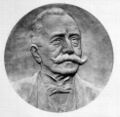Template:Selected anniversaries/March 15: Difference between revisions
No edit summary |
No edit summary |
||
| Line 54: | Line 54: | ||
||1933: Winston Churchill was very interested in science and wrote often and popularly on the subject. He chaired a conference in on the atomic discoveries in the Cavendish Laboratory in Cambridge. On this date his scientific friend, Frederick Lindemann said of him, "All the qualities … of the scientist are manifest in him. The readiness to face realities, even though they contradict a favourite hypothesis; the recognition that theories are made to fit facts, not facts to fit the theories; the interest in phenomena and the desire to explore them, and above all the underlying conviction that the world is not just a jumble of events but that there must be some higher unity." *Graham Farmelo, Churchills Bomb https://pballew.blogspot.com/2019/03/on-this-day-in-math-march-15.html | ||1933: Winston Churchill was very interested in science and wrote often and popularly on the subject. He chaired a conference in on the atomic discoveries in the Cavendish Laboratory in Cambridge. On this date his scientific friend, Frederick Lindemann said of him, "All the qualities … of the scientist are manifest in him. The readiness to face realities, even though they contradict a favourite hypothesis; the recognition that theories are made to fit facts, not facts to fit the theories; the interest in phenomena and the desire to explore them, and above all the underlying conviction that the world is not just a jumble of events but that there must be some higher unity." *Graham Farmelo, Churchills Bomb https://pballew.blogspot.com/2019/03/on-this-day-in-math-march-15.html | ||
File:You Can Make It If You Try - Sly Stone.jpg|Sylvester Stewart (born March 15, 1943), better known by his stage name Sly Stone, is an American musician, songwriter, and record producer who is most famous for his role as frontman for Sly and the Family Stone, playing a critical role in the development of soul, funk, rock, and psychedelia in the 1960s and 1970s. | |||
||1951: John S. Paraskevopoulos dies ... astronomer and academic. His goal -- building a large telescope in Greece -- was never realized, due to the war between Greece and Turkey. Pic. | ||1951: John S. Paraskevopoulos dies ... astronomer and academic. His goal -- building a large telescope in Greece -- was never realized, due to the war between Greece and Turkey. Pic. | ||
Revision as of 08:13, 1 March 2022
44 BC: Julius Caesar, Dictator of the Roman Republic, is stabbed to death by Marcus Junius Brutus, Gaius Cassius Longinus, Decimus Junius Brutus, and several other Roman senators on the Ides of March.
1897: Mathematician and academic James Joseph Sylvester dies. He made fundamental contributions to matrix theory, invariant theory, number theory, partition theory, and combinatorics.
1900: Mathematician and physicist Elwin Bruno Christoffel dies. He introduced fundamental concepts of differential geometry, opening the way for the development of tensor calculus, later providing the mathematical basis for general relativity.
1912: Mathematician Cesare Arzelà dies. He contributed to the theory of functions, notably his characterization of sequences of continuous functions.
Sylvester Stewart (born March 15, 1943), better known by his stage name Sly Stone, is an American musician, songwriter, and record producer who is most famous for his role as frontman for Sly and the Family Stone, playing a critical role in the development of soul, funk, rock, and psychedelia in the 1960s and 1970s.
1962: American physicist and academic Arthur Compton dies. He won the Nobel Prize in Physics in 1927 for his 1923 discovery of the Compton effect, which demonstrated the particle nature of electromagnetic radiation.





